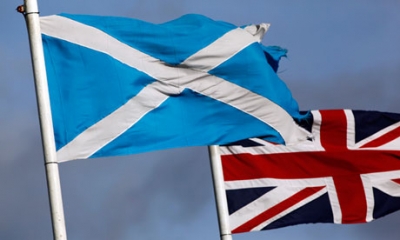On Monday the 13th March 2017, First Minister Nicola Sturgeon announced that she will seek the Scottish Parliament’s permission to request a Section 30 order from Westminster next week. A Section 30 order is the legislation required to allow a legally-binding referendum on independence to be held by the Scottish Government.
She told reporters that her decision was a direct result of the UK Government’s refusal to negotiate with the Scottish Government on a special Brexit deal for Scotland. She argued that it is now clear that Scotland is heading towards a ‘hard Brexit’ that it did not vote for and she must act to “give the Scottish people a choice about the kind of change we want”.
She added:
“I believe that it would be wrong for Scotland to be taken down a path that it has no control over regardless of the consequences for our economy, for our society, for our place in the world, for our very sense of who we are as a country. That would be wrong, and therefore my judgement is that we should have that choice,”
Ms Sturgeon will now formally ask the Scottish Parliament to request a Section 30 order from the UK Government. This means that she will have to gain the support of the majority of MSPs in the Scottish Parliament. While the leaders of the Scottish Conservatives, Scottish Labour and Scottish Liberal Democrats have promised to vote against the move – accusing Sturgeon of “seeking to divide Scotland”- the Scottish Greens have pledged to support the motion, giving the Scottish Government enough votes to pass.
The First Minister will then request a Section 30 order from the UK Government to hold a legally binding referendum. This must be approved by both Houses of Parliament – meaning that both MPs and the Lords will have to vote on whether to grant the Section 30 order. This means that the referendum could, technically, be blocked by the UK Parliament at this stage.
Leader of the Labour Party, Jeremy Corbyn, has already said that he will instruct Labour MPs not to block the referendum, and most experts are predicting that the Prime Minister will follow suit. While the UK Government opposes a second Scottish independence referendum, there are fears that any move to deny the Section 30 order would be viewed by the Scottish electorate as a fundamental undermining of devolution, democracy, and the Scottish Government’s authority– which many believe would bolster the argument for Scottish independence.
It is likely then, that the Section 30 order request will be approved. If so, the Scottish Government will then enter negotiations with the UK Government to set the date and procedures of the referendum. These details will then form the basis for a new Referendum Bill.
Ms. Sturgeon has indicated that she will be aiming to complete this process by early next year, with a view to holding the independence referendum between autumn 2018 and spring 2019 – before the UK formally exits the EU.
However, sources close to Prime Minister Theresa May suggest that the Scottish Government may be denied a referendum within that timeframe. Ms. May is now expected to push back the date of any referendum until several months after Brexit is formally triggered. This means that a new referendum might not take place until at least the summer of 2019.
Such a move would be a calculated risk on Ms. May’s part. On one hand, such action would help ensure that a new independence referendum would not derail the upcoming Brexit negotiations. However, on the other hand she risks playing into the SNP’s narrative of Scotland being continually put on the back-burner by Westminster, which could in turn stoke up further support for Scottish independence. If she does indeed choose to go down this path, she will have to think carefully about how best to minimise the inevitable criticism from independence supporters.
In Scotland itself, independence is once again the focal point of Scottish politics. Up until a few days ago, issues such as education reform, policing and the economy dominated the political agenda but with Ms. Sturgeon’s announcement, it can be safely assumed that the next few months will not be ‘business as usual’.
In First Minister’s Questions, expect the leaders of Scottish Labour and the Scottish Conservatives to be highly critical of the FM’s argument for independence, while simultaneously accusing the Scottish Government of failing to ‘get on with the day job’ and effectively govern Scotland. They will likely accuse the Scottish Government of being preoccupied with independence and neglecting devolved issues such as education, justice, and the NHS.
At the same time, Nicola Sturgeon is likely to counter these arguments, as she has done in the past, by stating that it is not her party continually raising the issue in Holyrood. Some commentators believe that she should turn her attention to her self-declared priority of reforming Scottish education, as a way to minimise the likely criticism of those who believe she is neglecting her job in her quest for independence. However, with the SNP conference beginning on the 17th of March, and thousands of excited independence supporters hanging on her every word, it remains to be seen how she will simultaneously play to her devoted supporters, while reassuring the rest of country that she is still focussed on the day-to-day issues which affect everyone.
For the business community, the combination of Brexit, a new independence referendum and a fluctuating economy makes for an uncertain future. In the coming weeks and months, the UK Government and the Scottish Government will have to make a concerted effort to reassure businesses that the UK is still a country safe to invest in and do business with – a hard task considering the uncertainty that the coming years are likely to bring.
And finally, for the Scottish people, another few years of polarising ‘Yes’ and ‘No’ campaigns will soon be underway. With opinion polls on the issue fluctuating, and the outcome widely considered too close to call, the future of Scotland in the Union is anything but certain.





